On This Page: [hide]
Combining the sophistication of generative artificial intelligence with the familiar necessity of web searching, SearchGPT introduces a conversation-based approach that promises to redefine our digital queries.
This article delves into the mechanics behind SearchGPT, comparing it with industry titan Google, and explores the potential it holds to transform our search experiences into something more intuitive, efficient, and personal.
Through a clear and accessible discussion, we aim to shed light on this innovative technology, its unique capabilities, and how it stands to impact the future of information discovery on the internet.
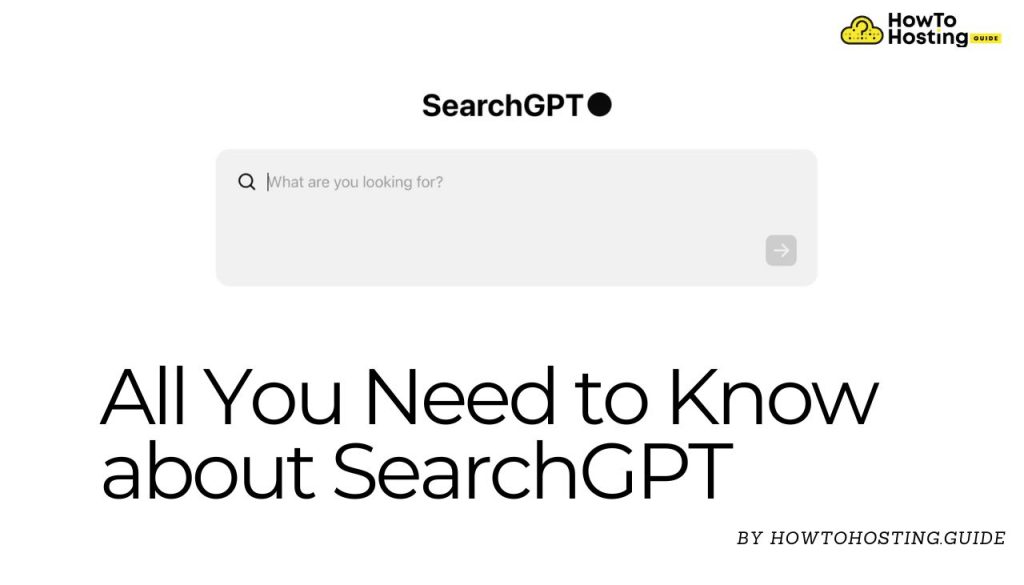
What Is SearchGPT and How Does It Work?
SearchGPT, a revolutionary search engine prototype developed by OpenAI, stands out as a direct challenge to Google’s dominance in the search engine arena. Unlike traditional search engines that rely on algorithms to crawl, index, and rank web pages, SearchGPT leverages generative artificial intelligence, specifically large language models like ChatGPT, to interpret user queries in a conversational style. This innovative approach aims to make the search process more intuitive, efficient, and user-friendly.
When a user queries SearchGPT, the tool does not simply list links. Instead, it generates a direct, conversational response, summarizing the information with clear links to relevant sources. This mechanism ensures that users can find what they are looking for faster, engaging in a dialogue with the AI that feels natural and human-like. The inclusion of source links also maintains transparency and allows users to delve deeper into topics of interest.
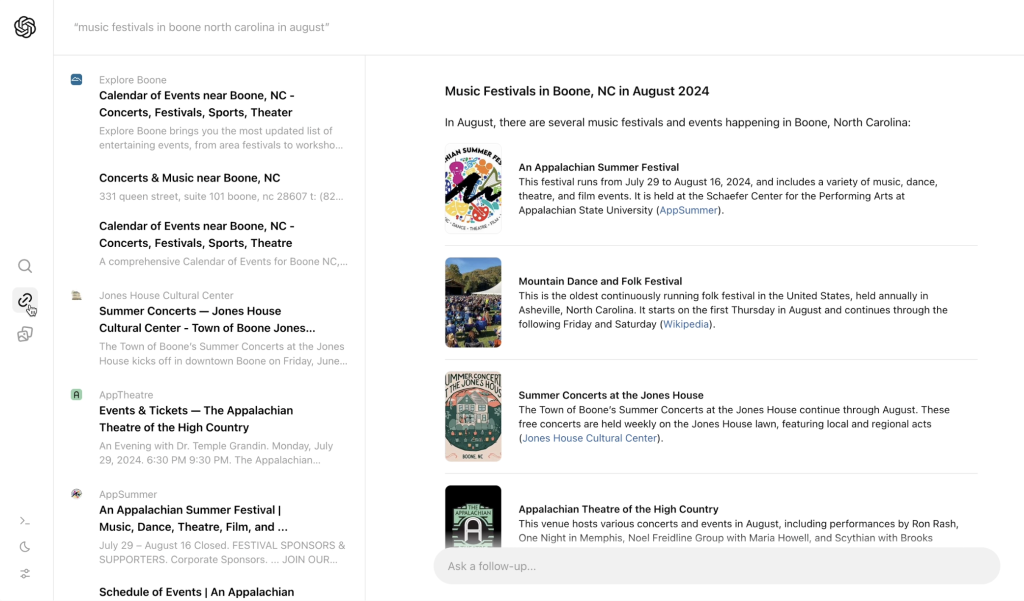
The Technology Behind OpenAI’s SearchGPT
At the core of SearchGPT’s functionality is the retrieval augmented generation (RAG) approach. This cutting-edge technique blends the generative capabilities of AI with the reliability of sourced information.
By drawing from a vast database of internet sources and the models’ own extensive training data, SearchGPT can provide precise answers that are both informative and up to date. It distinguishes itself from other AI tools by referencing trusted sites and directly citing them in its responses, which significantly reduces the instances of generating incorrect or ‘hallucinated’ information.
Furthermore, OpenAI’s dedication to continuous improvement through feedback from users and collaboration with publishing partners ensures that SearchGPT remains a relevant and powerful tool for online search. Through these efforts, SearchGPT not only respects copyright concerns but also supports the ecosystem of digital content creation by directing traffic back to original publisher sites.
Comparing SearchGPT With Google: Features and Capabilities
While Google has been the go-to search engine for decades, offering rapid access to a vast range of information, the emergence of SearchGPT introduces a new dynamic in the way we search for and interact with information online. One of the primary differences between SearchGPT and Google is in their interaction models.
Google provides a list of links and expects users to sift through them to find their answers, while SearchGPT engages users in a conversational exchange, aiming to deliver precise answers supplemented by links to the source content.
In addition, Google’s search results are primarily influenced by SEO practices and the website’s authority, which can sometimes lead to a biased presentation of information. In contrast, SearchGPT aims to democratize access to information by leveraging AI to understand the context and intent behind a user’s query, potentially offering a broader perspective on topics.
Another notable difference lies in their approach to monetization. Google relies heavily on advertising for revenue, which permeates its search results and user interface. SearchGPT, on the other hand, focuses on delivering informational value without the distraction of advertisements, at least in its current prototype form. This focus on user experience and quality of information could set new standards for what users expect from search engines moving forward.
In essence, while Google and SearchGPT both strive to fulfill the information needs of their users, their methodologies, interaction styles, and underlying technologies represent distinct philosophies about accessing and engaging with the web’s vast resources.
As SearchGPT continues to evolve, it could significantly influence the future landscape of search technology, offering a more intuitive, conversational, and transparent way for users to find the information they need online.
Why Is SearchGPT a Game Changer in Search?
The advent of SearchGPT by OpenAI marks a significant pivot in the search engine landscape. Traditionally, users have been reliant on keyword-based searches that return a list of links, requiring further action to glean the desired information.
However, SearchGPT transforms this process by merging conversational AI with robust search capabilities, providing answers directly in a dialogue format. This not only makes searches more interactive but also significantly enhances the efficiency of finding accurate information online. By leveraging the power of generative AI, SearchGPT aims to reduce the friction often experienced in traditional search engines, ushering in a new era of user-friendly search experiences.
The Impact of AI on Search Engines and User Experience
The integration of Artificial Intelligence (AI) into search engines has been a game-changer in how we access and interact with information on the internet. AI improvements have led to more relevant search results, smarter information retrieval, and personalized search experiences.
Specifically, SearchGPT’s conversational interface represents a major leap forward, streamlining the search process by understanding and responding to user queries in natural language. This conversational approach not only makes searching more intuitive but also allows for more complex queries to be understood and addressed accurately.
Furthermore, by linking directly to sources within its responses, SearchGPT ensures that users have immediate access to credible information, enhancing trust and reliability in the results provided.
How SearchGPT Plans to Revolutionize Online Searches
SearchGPT’s vision transcends the current expectations of search engines. Firstly, it aims to refine the accuracy of search results by understanding the context and intent behind user queries, providing direct answers supplemented with links to relevant sources.
This reduces the time users spend sifting through multiple websites to find answers. Secondly, the ability to ask follow-up questions creates an interactive experience that mirrors a natural conversation, adapting and providing more precise information based on ongoing interactions. Moreover, SearchGPT’s commitment to real-time information ensures that users receive the most current data, setting a new standard for timely and relevant search results.
Lastly, by partnering with publishers and prioritizing the citation of sources, SearchGPT fosters a transparent and equitable information ecosystem that benefits both users and content creators. This collaborative approach could redefine the dynamics of online search, making it more inclusive and rewarding for all stakeholders involved.
The Battle of Giants: SearchGPT vs. Google
As the landscape of online search evolves, a new player, SearchGPT, developed by OpenAI, has emerged as a contender against the behemoth of the internet, Google. This juxtaposition of technology and innovation sparks a conversation on the future of search engines and whether a generative AI model like SearchGPT has the potential to alter the current dominance held by Google.
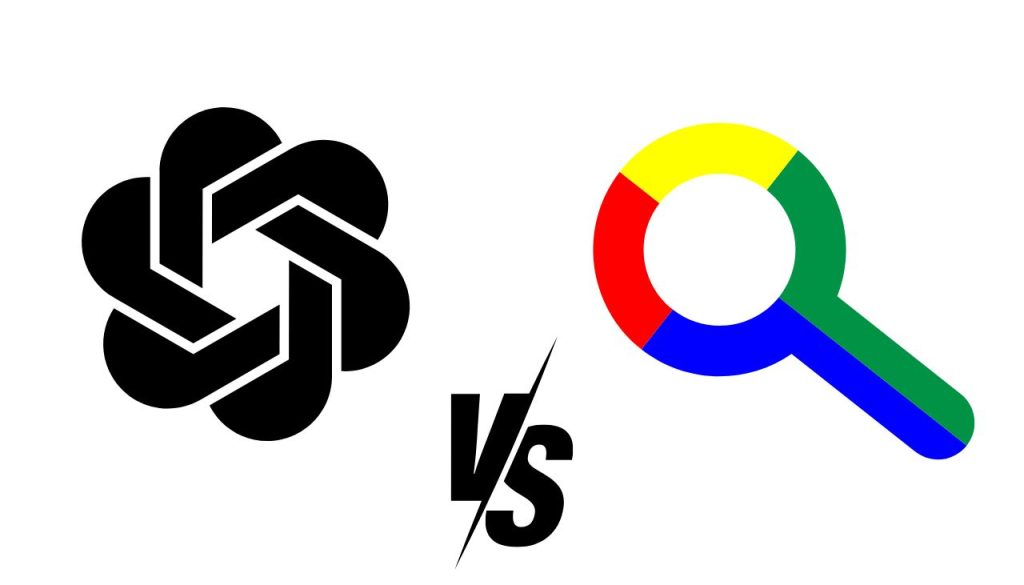
With Google long reigning supreme in the search engine market, the introduction of SearchGPT presents a refreshing alternative, pushing the boundaries of what AI can achieve in understanding and responding to user queries.
Can SearchGPT Dethrone Google’s Search Dominance?
While Google has dominated the search engine market for years with its sophisticated algorithms and vast database, SearchGPT brings a different approach to information retrieval. By leveraging generative artificial intelligence, SearchGPT aims to provide users with conversational, detailed responses, making the search experience more intuitive and engaging.
Although it’s early days, the unique capabilities of SearchGPT, such as providing summaries with clear, relevant sources and allowing for natural language follow-up questions, offer a glimpse into a future where search engines are more interactive and personalized. However, Google’s established infrastructure and deep integration into the web ecosystem present significant challenges for any contender.
Key Differences Between SearchGPT and Google Search Algorithms
The core difference between SearchGPT and Google lies in their underlying technologies and approach to delivering search results. Google’s search engine relies on crawling and indexing the web, using complex algorithms to rank pages based on relevance, popularity, and other factors.
In contrast, SearchGPT uses generative AI to provide answers in a conversational tone, summarizing information from various sources while linking back to publishers for detailed information. This fundamental difference highlights SearchGPT’s aim to enhance the user search experience by providing immediate, concise answers coupled with the option to explore topics in depth through linked sources.
Also, SearchGPT’s integration with ChatGPT allows for a seamless continuation of queries, where users can ask follow-up questions in natural language, further distinguishing its user experience from Google’s more traditional search query input and results display. This innovative approach to searching not only challenges Google’s model but also sets a new standard for how future technologies might integrate AI to make the web more accessible and comprehensible.
Despite these innovations, Google’s search engine possesses advanced features such as highly localized search capabilities, intricate understanding of web page authority, and a vast index of the internet. These features ensure that Google remains a powerful force in the search engine market.
However, the emergence of SearchGPT signifies a shift towards a more interactive, AI-driven approach to searching, promising to make the acquisition of online information faster, easier, and more engaging for users worldwide.
As the competition between SearchGPT and Google unfolds, it will be fascinating to observe how each adapts and evolves. Will SearchGPT’s AI-driven, user-centric approach set a new benchmark, or will Google’s continual innovations maintain its long-held dominance? Only time will tell, but the battle of the giants is undoubtedly making the future of search an exciting space to watch.
User Perspective: What Makes SearchGPT Attractive?
From the perspective of a user, the attractiveness of SearchGPT lies in its innovative approach to delivering search results. Unlike traditional search engines that provide a list of links, SearchGPT reshapes the search experience through a conversational interface, making it more interactive and personal.
Users can receive answers directly, all while having the option to explore more through provided links to sources. This ability to combine the power of OpenAI’s language models with real-time web search capabilities introduces a user-friendly search that simplifies the process of finding accurate and reliable information.
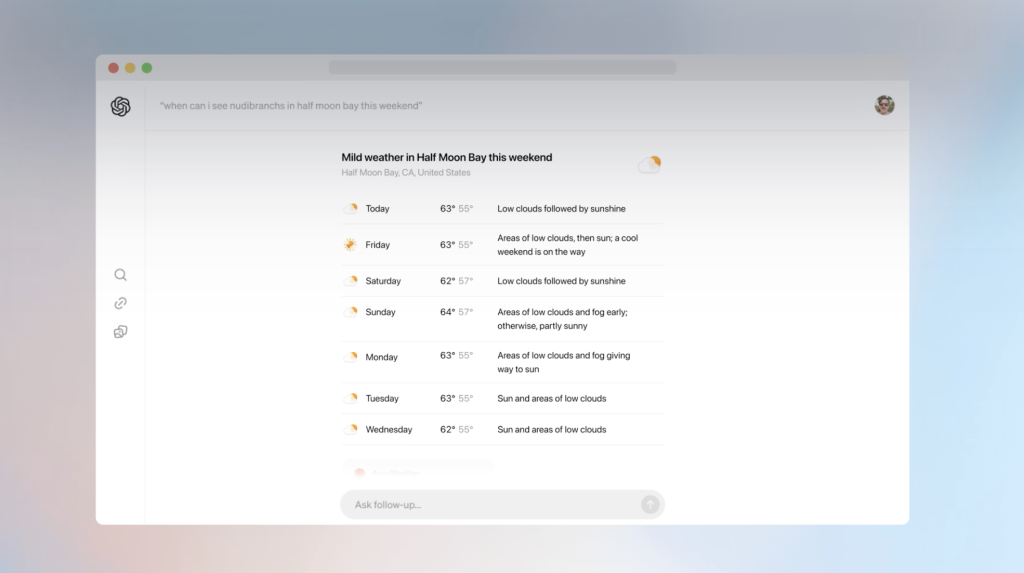
Enhancing User Experience with AI: The SearchGPT Approach
SearchGPT fundamentally changes how users interact with search engines by emphasizing a more natural, conversational flow of information. This is achieved through the use of OpenAI’s advanced AI models, which not only understand the user’s query but also the context behind it. With the assistance of these models, SearchGPT delivers tailored responses that match the user’s immediate needs.
The inclusion of relevant web links directly within the answers further enriches user exploration, making it easy to find trusted information. In addition, the AI-driven approach means that SearchGPT can continuously learn and adapt to provide better responses over time, ensuring that the user experience is always at the forefront of its development.
Security and Privacy in the Age of AI-Powered Search Engines
In an era where digital security and privacy are paramount, AI-powered search engines like SearchGPT are stepping up to address user concerns. The responsible handling of user queries and data is a fundamental aspect of SearchGPT’s design.
It prioritizes the protection of user information while ensuring that the search results are not only relevant but also secure. In instances where the use of a search engine might introduce vulnerabilities, it’s beneficial to rely on advanced security solutions.
Future Projections: The Road Ahead for SearchGPT
The introduction of SearchGPT by OpenAI marks a pivotal shift in the digital search landscape. As it steps into an experimental phase, this AI-driven tool opens up new pathways for how we conceive of and interact with search engines.
Traditional search engines have long held reign over how we find information on the internet, with Google at the forefront. However, the conversational and intuitive nature of SearchGPT could herald a more natural and efficient way to navigate the vast expanse of the internet.
As SearchGPT evolves, we can anticipate significant advancements in AI technology that will further refine and enhance the user experience. One of the most promising aspects of SearchGPT is its potential to provide up-to-date information in a more conversational and engaging manner.
This could lead to a more personalized search experience, where the tool remembers past interactions and preferences to tailor future search results. Moreover, as the tool integrates more deeply with other OpenAI technologies and perhaps even other digital platforms, its utility and versatility will only increase.
There’s also the broader impact on the search industry to consider. With OpenAI’s foray into search, we could see increased competition in the search market, encouraging innovation and possibly leading to a variety of new search tools tailored to specific user needs or sectors. This competition could drive improvements in accuracy, reliability, and user interface design across the board.
How OpenAI’s SearchGPT Could Reshape the Internet
The integration of generative AI like SearchGPT into search processes represents a paradigm shift in the way we access and interact with information online.
By moving away from the traditional list-based search results to a conversation-based interface, users can have a more natural interaction with the technology, akin to asking a knowledgeable friend for advice. This could make the internet more accessible to people who may find current search technologies intimidating or overly complicated.
Furthermore, the ability to understand and interpret user queries in a human-like manner means that SearchGPT could offer more relevant and contextual responses, reducing the time and effort it takes to find accurate information.
This shift could also influence how websites are designed and how content is created and optimized for search. Publishers and content creators may start to prioritize clarity and conciseness, knowing that their content needs to be easily interpretable by AI to be effectively recommended.
Finally, SearchGPT’s approach to citing and linking to sources could foster a better relationship between AI technologies and content creators. By ensuring that original sources are prominently credited, OpenAI could set a precedent for ethical AI use that respects copyright and promotes fair use of digital content. This aspect is especially crucial as the industry grapples with issues of copyright infringement and content reuse without adequate attribution.
Investments and Innovations: What’s Next for OpenAI’s SearchGPT?
The future of SearchGPT lies in ongoing investment and innovation. OpenAI’s commitment to improving and expanding the capabilities of SearchGPT suggests a roadmap filled with enhancements that could make it an even more powerful tool.
Continuous learning from user interactions and feedback will be key to refining its algorithms, ensuring that the search tool becomes smarter and more reliable over time.
In addition, strategic partnerships with publishers and content creators will play a crucial role in the development of SearchGPT.
Finally, OpenAI’s plans to possibly integrate advertisements and monetization models into SearchGPT will be closely watched. How the organization balances maintaining a user-friendly interface with the need for revenue generation could influence the sustainability and scalability of the project. As we look towards a future where AI-driven search engines become the norm, it’s clear that innovations like SearchGPT represent just the beginning of a transformation in how we search for and find information online.
Is Your Data Safe With AI-Powered Search Engines?
With the advancement of AI-powered search engines like SearchGPT, the way we retrieve information online is transforming. These innovative platforms promise to deliver not just faster, but richer and more conversational interactions with digital content.
However, this leap forward brings about valid concerns regarding data privacy and security. As search engines evolve to become more intelligent, they also access and process vast amounts of personal information, raising questions about the safety of our data online.
Traditional search engines have long been under scrutiny for how they handle user data, with practices often veering into uncomfortable territories of data mining and targeted advertisements. AI-powered search engines, by building on these capabilities, intensify these concerns. They not only have to manage the data they directly collect but also need to navigate the ethical and privacy challenges posed by the third-party content they interact with and present to users.
The introduction of more sophisticated AI into search technologies means that these engines can understand and predict user needs with unprecedented accuracy. Yet, this also necessitates stringent safeguards and transparent practices to ensure that the heightened capabilities do not come at the cost of user privacy or security.
Protecting Your Privacy and Security in an AI-Driven World
Navigating the vast digital world with AI-driven tools can feel like a double-edged sword. On one hand, AI enhances our ability to access information, tailor experiences, and interact with content in revolutionary ways. On the other hand, it places an enormous responsibility on individuals to manage their digital footprint and protect their privacy. Here are straightforward steps to help maintain privacy and security:
- Use strong, unique passwords for all online accounts and manage them with a reputable password manager to keep your login details secure.
- Be cautious of phishing attempts. AI-driven search technologies may be used to create more convincing fake websites and emails. Always verify the authenticity of information before clicking on links or downloading attachments.
- Use a VPN to encrypt your internet connection, especially when using public Wi-Fi networks, to protect your search data from prying eyes.
- Review and adjust the privacy settings on your digital accounts and devices to minimize data sharing.
Expert Opinions: What Industry Leaders Think About SearchGPT
“AI search is going to become one of the key ways that people navigate the internet, and it’s crucial, in these early days, that the technology is built in a way that values, respects, and protects journalism and publishers. We look forward to partnering with OpenAI in the process, and creating a new way for readers to discover The Atlantic.”
– Nicholas Thompson, CEO of The Atlantic
SearchGPT, as introduced by OpenAI, is catching the eye of technology and industry leaders around the globe. With its conversational approach to search, leveraging advanced AI to provide more natural and intuitive search experiences, there’s a consensus that this innovation could significantly disrupt the status quo. Notably, the leaders within the search industry see SearchGPT as a major step forward in making information retrieval not just faster but also more relevant and personalized.
What sets SearchGPT apart is its ability to understand and respond to queries in a more human-like manner. Unlike traditional search engines that often return a list of links, SearchGPT aims to provide succinct, directly relevant answers. This ability to refine searches based on ongoing dialogue with the user has been particularly highlighted as a potential game-changer, offering a more interactive and engaging search experience. Industry analysts suggest that if developed and scaled effectively, SearchGPT could encourage a shift towards more conversational online interactions.
Moreover, the strategic partnerships with news publishers and content creators, aiming to provide up-to-date information with clear source attribution, are seen as a strong move towards maintaining the integrity and reliability of information retrieved. This approach not only serves the users by ensuring they receive accurate and current information but also benefits publishers by driving traffic directly to source materials.
Insights on SearchGPT’s Potential to Disrupt the Search Industry
The potential of SearchGPT to disrupt the traditional search market is vast. By integrating generative AI with search capabilities, OpenAI could redefine the way users interact with search engines. The key to its disruption lies in its promise to offer a more engaging and intuitive search experience, effectively reducing the effort and time typically required to find relevant information. This could diminish the dominance of keyword-based search queries, introducing a new paradigm where conversational interactions lead to more precise results.
Analysts also highlight the advantage of SearchGPT’s model when it comes to understanding context and nuance in user queries. This advanced understanding could significantly improve search accuracy, making it a preferred option for users seeking specific and complex information. Furthermore, the collaborative efforts with publishers to ensure accurate source citation and linking could enhance user trust in the search outcomes, further solidifying SearchGPT’s position in the market.
The Challenges Ahead for OpenAI and SearchGPT
Despite the promising outlook, there are significant challenges ahead for OpenAI and SearchGPT. The technology’s reliance on AI and natural language processing means that ongoing refinement and learning are essential to avoid inaccuracies or ‘hallucinations’, where the AI might generate misleading or incorrect information. Ensuring the reliability of SearchGPT’s responses will be crucial to its adoption and long-term success.
In addition, the legal and ethical implications surrounding copyright and content usage present a complex hurdle. Although OpenAI has made efforts to collaborate with publishers and ensure content is used fairly, navigating copyright concerns, especially on a large scale, remains a pivotal challenge. Staying ahead of these issues while continuing to innovate will be key for OpenAI as it seeks to expand SearchGPT’s capabilities and user base.
Moreover, with the landscape of AI and search constantly evolving, staying at the forefront of technological advancements will require significant investment and adaptation. As competitors also aim to integrate similar AI-driven features, setting SearchGPT apart through superior accuracy, user experience, and ethical practices will be crucial. Addressing these challenges head-on, with a transparent and user-focused approach, could significantly determine the path forward for SearchGPT in the dynamic search industry landscape.
How to Get Started With SearchGPT: A User Guide
Embarking on the journey with SearchGPT promises a refreshing twist on the traditional online search, blending OpenAI’s cutting-edge AI with comprehensive web information. Launching into this avant-garde search tool begins with a simple yet crucial phase: signing up and setting up your portal into AI-enhanced search capabilities.
Sign-Up and Initial Setup: Your Gateway to AI-Powered Searches
The first step is straightforward – joining the waiting list for access. With its initial launch limited to a select 10,000 users and publishers, securing a spot early is key. Once you’ve made it off the waitlist, you’ll find setting up SearchGPT to be a seamless process, guided by user-friendly prompts. This setup is your gateway, not just to faster, but smarter search results, enriched with AI’s understanding and speed.
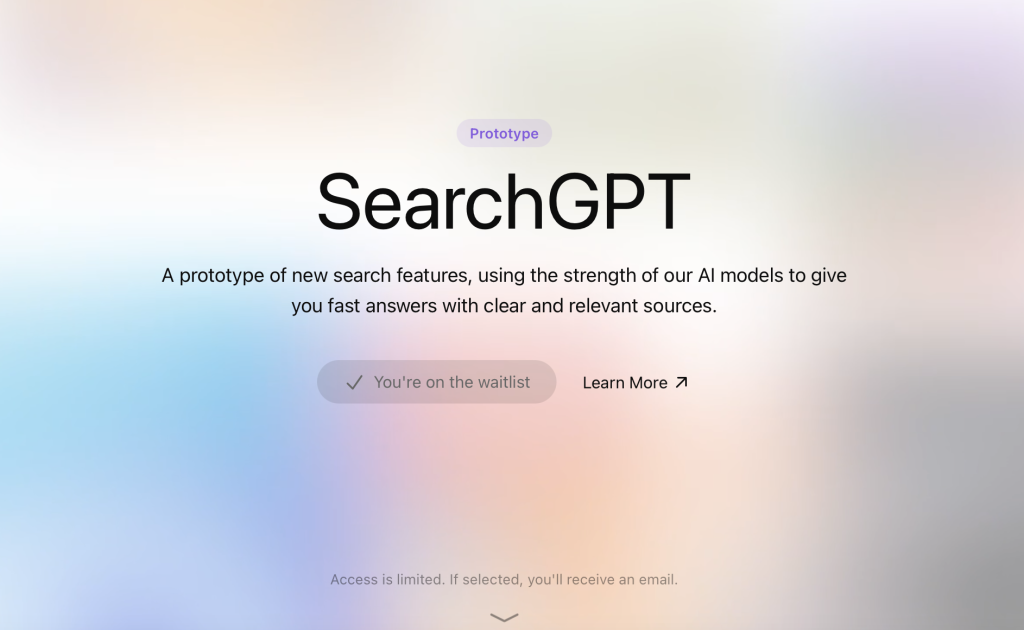
Tips and Tricks for Optimizing Your SearchGPT Experience
Diving into SearchGPT offers a unique blend of traditional search mechanisms and innovative AI insights. To truly capitalize on its capabilities, certain strategies can enhance your searching experience:
- Utilize Specific Queries: Detailed questions yield more targeted answers. Think of conversing with a knowledgeable guide rather than tossing vague inquiries into the digital expanse.
- Explore the ‘Browse Mode’: Beyond typed queries, engage with the browse mode – feature that presents a more interactive and exploratory search journey.
- Follow Up for Depth: Don’t stop at the first response. Ask follow-up questions to delve deeper into the topic at hand, mimicking a dynamic dialogue with an expert.
- Check the Sources: SearchGPT provides links to sources within its answers. Make a habit of exploring these for a broader perspective and to verify the information’s accuracy.
- Feedback Loop: Lean into the prototype aspect by providing feedback. Your insights could help shape the future of AI-powered search, making it more attuned to user needs.
By embracing these strategies, users can unlock the full potential of SearchGPT, making their search experience not only more efficient but far more engaging. Remember, the aim is to create a symbiotic relationship where your inquiries guide the AI to produce the most relevant and comprehensive responses, with every question poised as an opportunity to refine the intelligence of SearchGPT.
The Verdict: Will SearchGPT Be the New Search Engine Leader?
The introduction of SearchGPT by OpenAI represents a notable change in the search engine landscape. This innovative tool merges generative artificial intelligence with web search capabilities, providing users with conversational responses linked to up-to-date information sources.
But does this make SearchGPT a contender for the title of the new search engine leader? The question is complex, and the answer hinges on several factors including advancements in AI technology, partnerships with publishers, and user adoption rates.
Comparing Future Projections: SearchGPT vs. Google’s Evolving Algorithms
Google has long been the reigning champion of search engines, largely due to its complex and continually evolving algorithms. The tech titan has maintained a vast lead over competitors by delivering rapid and relevant search results.
However, the emergence of SearchGPT introduces a unique variable into this equation. By combining conversational AI with search capabilities, SearchGPT offers a more interactive and intuitive search experience. This could appeal to users looking for a more direct and engaging way to find information online.
However, Google is not standing still. It has already started integrating AI into its search functions to provide more precise and summarized information to user queries. The battle between SearchGPT and Google’s algorithms may ultimately come down to which platform can offer the most accurate, timely, and relevant search results while ensuring user trust and safeguarding against misinformation.
The Ultimate Battle: AI Innovation vs. Search Engine Legacy
The competition between SearchGPT and established search engines like Google might be viewed as a clash between innovative AI-driven search capabilities and the powerful legacy of existing search technologies. On one side, SearchGPT’s AI-driven model promises to simplify the search process, potentially making it faster and easier for users to find what they’re looking for through a natural conversational interface.
Its reliance on up-to-date web information and clear attribution to sources also aims to address copyright concerns and misinformation, marking significant strides toward ethical AI use in search.
Conversely, Google’s long-standing dominance is supported by its vast index of the web, sophisticated ranking algorithms, and a deep understanding of user search intent. Google’s efforts to weave AI into its framework – without disrupting the familiar search experience users rely on – underscore its commitment to enhancing its service without compromising quality.
In conclusion, whether SearchGPT will become the new leader in search engines depends on its ability to match or surpass the efficiency, reliability, and trustworthiness of established players like Google. As it stands, the evolution of AI technologies and their integration into search functionalities present an exciting frontier with the potential for reshaping how we access information online.
Nevertheless, the sustainability of SearchGPT’s innovative approach, alongside its adaptation to user feedback and ethical considerations, will play crucial roles in its journey toward becoming a key player in the search engine market.
